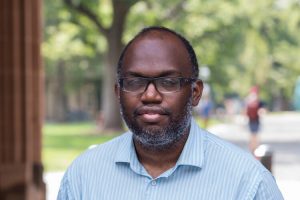 Dominican by birth and New Yorker by upbringing, he tricked himself into writing four junior papers and two senior theses en route to graduating summa cum laude from Princeton in Classics with a WWS certificate (2006; Latin Salutatory). He held the Daniel M. Sachs Class of 1960 Graduating Scholarship to read for the M.Phil. in Greek and Roman History at Oxford (2008); the next stop was a Ph.D. in Classics from Stanford (2014), generously supported by the Stanford Interdisciplinary Graduate Fellowship. After a two-year postdoctoral stint at Columbia’s Society of Fellows, he returned to Princeton. In addition to his appointment in Classics, he is affiliated with the Program in Latino Studies.
Dominican by birth and New Yorker by upbringing, he tricked himself into writing four junior papers and two senior theses en route to graduating summa cum laude from Princeton in Classics with a WWS certificate (2006; Latin Salutatory). He held the Daniel M. Sachs Class of 1960 Graduating Scholarship to read for the M.Phil. in Greek and Roman History at Oxford (2008); the next stop was a Ph.D. in Classics from Stanford (2014), generously supported by the Stanford Interdisciplinary Graduate Fellowship. After a two-year postdoctoral stint at Columbia’s Society of Fellows, he returned to Princeton. In addition to his appointment in Classics, he is affiliated with the Program in Latino Studies.
His core research and teaching focus is the Roman Republic and early Empire. Blending social-scientific techniques with literary and material evidence, Divine Institutions (in progress; PUP) argues that temple construction and pilgrimage networks held the “imperial Republic” together as it expanded across Italy and the Mediterranean. In a happy case of superfetation, several shorter projects are gestating together with the book: articles on the religious world of Rome’s slaves, divination’s play with local ecologies, and families with quirky names are all in various stages of preparation. Two pieces on Varro—for whom he has a particular fondness—will see the light of publication soon; and a co-edited volume of essays on Roman appropriation (Empire of Plunder: CUP) is approaching the finish line. The common thread is an enduring concern with patterns of cultural and intellectual exchange; an interest in new approaches that can better illuminate those patterns; and an ecumenical attitude to the many different kinds of ancient evidence available to us.
He also works on classical reception in contemporary American and Latin American cultures. An essay on the politics of classical reception in Santo Domingo will appear in The Oxford handbook of comparative political theory, and he is contributing to a volume on classical receptions in the Black Atlantic. The classical reception hat will stay on as he digs into a new project on conceptions and practices of citizenship across time. Another new project keeping him busy these days has as its major theme waste and its handling from antiquity (and as mediated by antiquity) to the present. Scratching the itch of his fascination with waste is taking him on a journey whose final destination is known only to the gods; early thoughts were distilled into a meditation on waste and funk for Liquid Antiquity, curated by his colleague Brooke Holmes.
A staunch believer in the importance of public scholarship, he’s written for and sits on the editorial board of the journal Eidolon: past articles include an essay on Greco-Roman receptions in hip-hop and a two–parter on immigration that was picked up by Newsweek. In 2015 he published a memoir on the intersection of his migratory subjectivity and Dominican identity with his formation as a classicist (Undocumented: A Dominican boy’s odyssey from a homeless shelter to the Ivy League: Penguin Press); he’s since written shorter pieces for The Guardian, Matter, and Vox. This writing is motivated by the sense that writing and teaching have a vital role to play in the pursuit of social justice, and by the strong conviction that classics and classicists should be allies and champions for black and brown folk. He loves nothing more than to proselytize for classics and the humanities.
